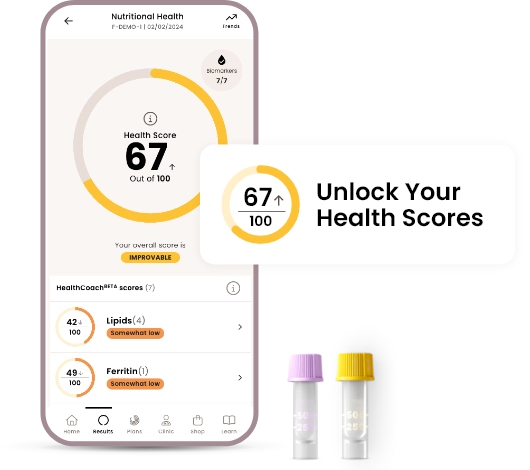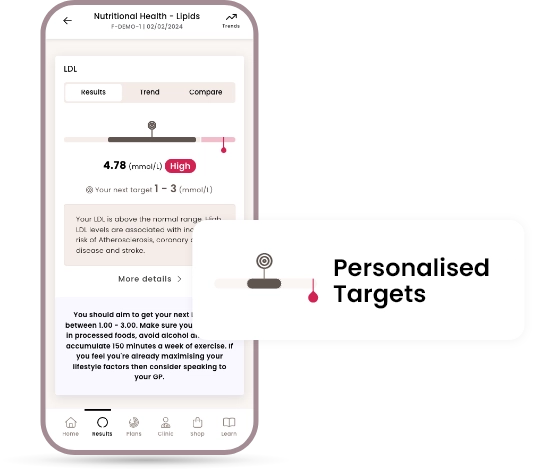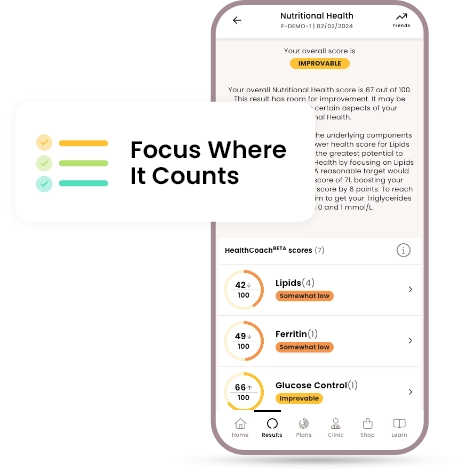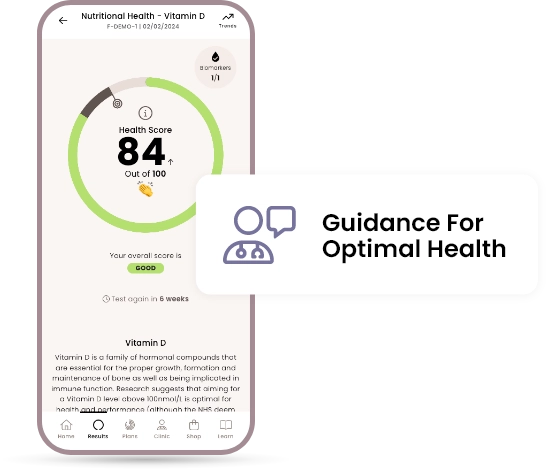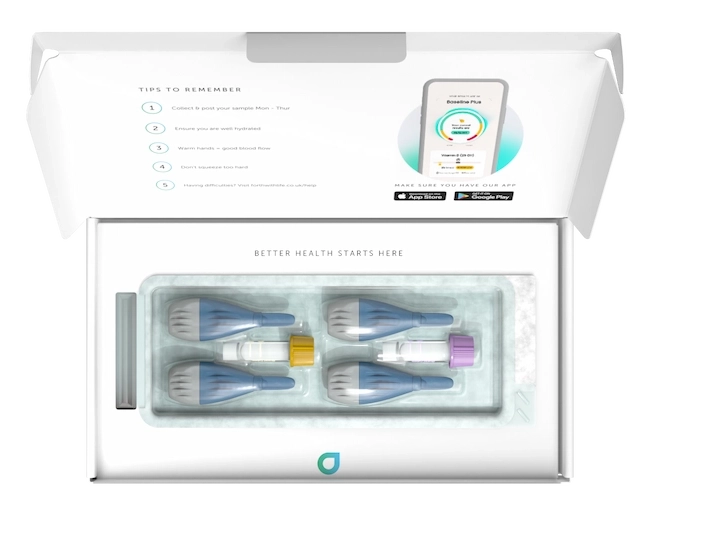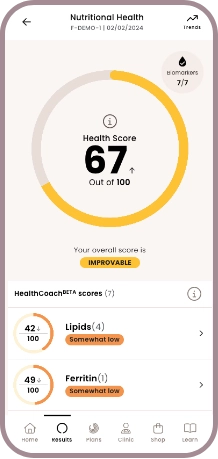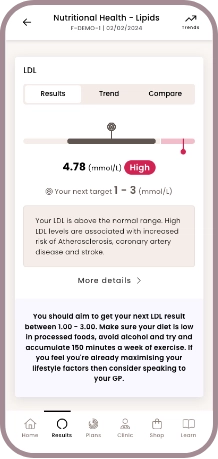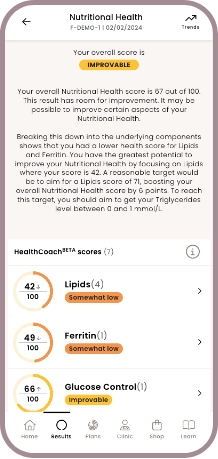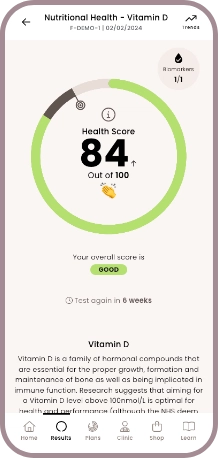About flexible subscriptions
How does a subscription work?
When you purchase this test subscription plan, we will automatically send you another test kit in a few months. Don't worry - you have full control over when this will be, and you can change/cancel it anytime.
When you first purchase this test, you can choose your subscription options in the checkout. We do this, because we recommend taking multiple tests over time to track how your biomarkers change. You'll be charged per test kit (rather than monthly, for example).
Why subscribe to multiple tests?
One test will show you what areas you need to focus on, continued testing will help you learn how your training, diet and lifestyle is impacting your health.
How often should I test?
We recommend a follow up test 3 months after your first test, followed by a test every 6 months depending on your results, but its up to you!
Can I change what's tested in future tests?
Yes, you can tailor/customise subsequent tests (via your app) to focus on just the areas that need improving.
Nutricheck - Vitamin Deficiency Blood Test
£109
If you're wanting to check your diet is supporting your overall health, our vitamin deficiency blood test can help. By checking key nutrients like iron, vitamin D, B12 and magnesium, along with other health markers, we can give you a better understanding of whether or not your diet is providing everything your body needs.
Validated & analysed by NHS Lab
Tracked 24 delivery
Finger prick or venous collection
Results in 2 working days
3 Interest-free payments
Learn more
Shop now. Pay over time with Klarna
Klarna available at checkout.
Klarna's Pay in 3 / Pay in 30 days are unregulated credit agreements. Borrowing more than you can afford or paying late may negatively impact your financial status and ability to obtain credit. 18+, UK residents only. Subject to status. Ts&Cs and late fees apply.
What gets tested?
14 Biomarkers
Blood sample collection options
How does it work?
When do I take the test?
Collect your blood sample within 3 hours of waking and before food.
Certified for quality & security
Blood sample collection options
You can choose your preferred collection method when you checkout
Finger prick kit (FREE)
You can do this test at home without the need for a doctor. We'll send you everything you need to collect your sample and post it back to us. And it's all included in the cost. We've put together a video that covers the process, making it easy to check and track your health from home.
Home nurse appointment (+£60)
We'll arrange for a medical professional to visit your home and collect your sample. This is great if you're unsure on how it all works or have trouble collecting a sample. No need to book a doctor's appointment or visit a clinic, we'll send you everything you need to collect a sample and post it back to our labs.
Visit a partner clinic (+£45)
Once you've ordered your test, look out for an email from our phlebotomy partners containing information and a link to book your appointment. We'll send you everything the clinic will need to complete the sample and post it back to our labs.
Organise a nurse myself (FREE)
If none of the above options work for you, you can arrange your own medical professional to collect your sample. There is no additional charge for this. Once you've ordered your test, we'll send you everything you and your chosen medical professional will need to collect a sample and post it back to our labs.
Still unsure how it works? You can find more information on collection methods and the service we provide in our 'How it Works' section.
How does it work?
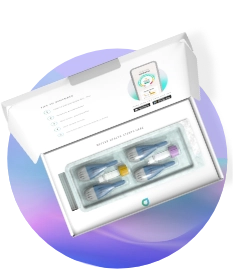
1. Choose your blood test
No need to wait for a GP appointment, your kit will arrive within 1-2 days, which includes everything you need to collect your blood sample and post it back to our labs.
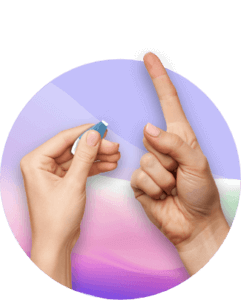
2. Collect your sample
Take your finger prick blood sample at home, or choose to have your blood taken at a Superdrug health clinic or a nurse at home. Return to our NHS lab using our prepaid envelope.
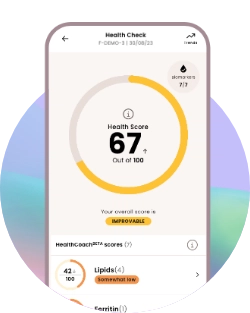
3. View your results
View your results on your secure health dashboard within 2 working days of our lab receiving your sample. Read personalised comments from our GPs.
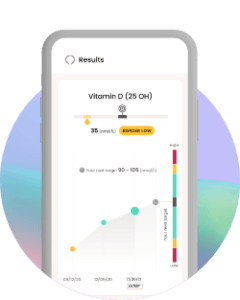
4. Make improvements
With more in-depth results, you will be able to identify areas that need improving. Make the changes and track your progress.
What gets tested?
14 Biomarkers Included
Additional biomarkers can be added by personalising this test.
What are biomarkers?
Biomarkers are specific compounds we can detect in your blood sample that reflect different things about your health. Your test will tell you your levels for each of the above biomarkers, and whether they are in a normal range.
Did you know?
1 in 6 adults have a below-recommended vitamin D levels
GOV UK: New review launched into vitamin D intake to help tackle health disparitiesUnlock your health scores with HealthCoach™
Powered by cutting-edge technology, Forth’s industry leading app goes beyond reporting basic biomarker results and one-size-fits-all health advice to deliver a comprehensive roadmap to better health.
Your Nutricheck – Vitamin Deficiency Blood Test will give you the following Health Scores
Nutritional health
What are vitamins and minerals?
Vitamins and minerals are essential nutrients that our bodies need to function properly. Vitamins are organic compounds that help regulate various bodily processes and support overall health. They are needed in small amounts and can be obtained from food or supplements. Minerals, on the other hand, are inorganic substances required for various physiological functions, such as building strong bones, transmitting nerve impulses, and maintaining fluid balance. They are also obtained through diet and are crucial for maintaining good health. Both vitamins and minerals play vital roles in keeping our bodies functioning optimally and preventing deficiencies and health problems.
Causes of vitamin and mineral deficiencies
Vitamin and mineral deficiencies can happen for a variety of reasons. One common cause is poor diet. If your diet is lacking in fruits, vegetables, or other nutrient-rich foods, you might miss out on important vitamins and minerals. Some health conditions, like IBS, can affect how your body absorbs nutrients. Some medications may interfere with nutrient absorption or increase nutrient excretion. Lifestyle choices, like restrictive diets or excessive alcohol consumption, can also lead to deficiencies. Some people, like pregnant women, young children, and older people, might need to pay extra attention to their diet to avoid falling short.
How to test your vitamin and mineral levels
Our vitamin deficiency test makes it easy to test your nutrient levels at home. It includes everything you need to collect a small blood sample and post it back to our labs. Our doctors will provide detailed insights into your vitamin and mineral levels and advice on how to improve your health. We recommend you collect your sample within 3 hours of waking up and before you eat.
Frequently asked questions
This is what our customers ask us most about this test. For more information, try our help centre.
Do I need to take vitamin supplements?
A healthy and balanced diet should give you all the vitamins and nutrients you need, but supplements can help to boost deficiencies or to optimise levels where you are struggling to consume a diet rich enough in vitamins. Pregnant women need more ferritin, so supplementation might be a more convenient method to manage the body’s demands. We get a lot of our vitamin D from sunlight, so it can be helpful to take vitamin D supplements during the winter to boost levels of this important vitamin in the darker months or if you struggle to get enough sunlight to ensure your Vitamin D levels are optimised.
What foods are high in vitamins?
There are lots of vitamins and minerals your body needs to function properly, from energy to hair growth. The key to staying healthy is eating a balanced diet, limiting the amount of ultra-processed foods you consume and tracking your vitamins and minerals through blood testing to ensure you are managing any vitamin levels that could be improved.
What do vitamins help with?
Vitamins and minerals keep you going and ensure the normal functions of cells – from hair growth, energy, immune system, vision and so much more.
How soon will the test arrive?
If you order your test before midday on a Monday to Friday then your kit will be dispatched
the same day.
All our kits are sent out via Royal Mail first class post, so it should be with you within 1-2
working days.
How secure is my data?
We have strict processes in place to ensure the protection of your data. Following GDPR the company also operates under tight legal rules about the sharing of data which ensures that data is only shared if it is crucial to the delivery of our service. For example, our doctors see customer results at the time of review, however, after review, access to results is withdrawn.
Learn more about your data security.
Can I have someone take my blood for me?
Yes. We offer two options if you do not want to do our finger prick test. The first is a home appointment where a nurse comes to your home to take a blood sample. The second is to visit a Phlebotomy clinic near you that offers a blood sample service.
A blood sample will be taken from your vein and we will provide you with everything you need to give to the nurse to allow them to take the sample.
The nurse will give you the blood sample to return to us using the pre-paid envelope provided.
Does a doctor review my results?
We have a team of doctors and nurses who look at all results and will comment on any results that are outside of the normal range for your age.
Can I download the results to share with my GP?
Yes, you can download your results from your health dashboard as a PDF to share with your GP.
Learn how to export your results.
We are dedicated to supporting you on improving your health
Go to help center
Nutricheck – Vitamin Deficiency Blood Test, recommended by our doctors
"A Vitamin Deficiency Blood Test is a powerful tool for optimising health. It identifies deficiencies in essential vitamins like D, B12, and folate, guiding your nutrition and supplementation. Addressing deficiencies can enhance energy levels, immune function, and overall well-being, preventing long-term health complications and promoting vitality."
Dr Thom Phillips
Similar tests
- Health scores calculated
Close
We're changing people's lives
How our Nutricheck – Vitamin Deficiency Blood Test works
Getting the insights you need to improve your health has never been easier.

1. Choose your blood test
No need to wait for a GP appointment, your kit will arrive within 1-2 days, which includes everything you need to collect your blood sample and post it back to our labs.

2. Collect your sample
Take your finger prick blood sample at home, or choose to have your blood taken at one of our partner clinics or a nurse at home. Return to our NHS lab using our prepaid envelope.

3. View your results
View your results on your secure health dashboard within 2 working days of our lab receiving your sample. Read personalised comments from our GPs.

4. Make improvements
With more in-depth results, you will be able to identify areas that need improving. Make the changes and track your progress.
What's included in this test?

1x Yellow Tube
1x Purple Tube
4x Lancets

1x Cleansing wipes

Plasters

2x Alcohol swabs
1x Return pouch

1x Tracked 24 return envelope
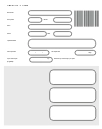
1x Lab request form
Blood sample kit
Results within 2 working days
Tracked 24 delivery & return
Secure health dashboard
Accredited lab analysis
Doctor reviewed results
Our impact in numbers...
70+
From hormones to nutrients, we offer 70+ different tests
60,000+
We've helped over 60,000 people improve their health
800,000+
We've delivered over 800,000 test results
Related articles
Like this article? Here are some more based on similar topics.
Nutricheck - Vitamin Deficiency Blood Test

